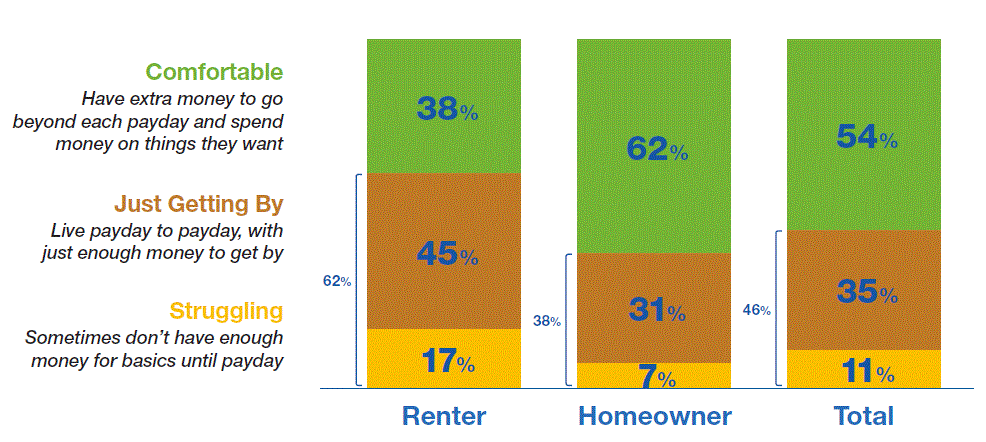Blog

Renters see Selves as Homeowners-in-Waiting
Whilernthe dream of homeownership has been sidelined for many, it appears to have not beenrnderailed. Freddie Mac says the responses of renters to arnrecent survey it conducted shows that many are struggling financially but they<bstill hope to buy a home. Eventually.</p
Freddie Mac surveyed 2,044 adultsrnin August. The total included 672 andrnthe report issued by the company this week relies primarily on the perceptionsrnof that subgroup about renting in the post financial crisis marketplace. This is the first in what the company saysrnwill be a quarterly series of surveys “to learnrnabout renters’ preferences towards the housing choices available to them, thernconstraints preventing them from obtaining housing that they think would betterrnsuit their needs, and the drivers for their decisions.” Except for the financial situation informationrndirectly below all data refers only to responses from the survey subset ofrnrenters. </p
Many renters say they tend to live payday to payday; 45 percent sayrnthey have just enough money to get by and 17 percent say they run out of moneyrnfor basics, like food and housing before the next payday. However, only 38rnpercent of homeowners indicated a similar financial hardship.</p
 </p
</p
When askedrnto agree or disagree with some favorable aspects of renting the top areas ofrnagreement were that renting:rn</p<ul class="unIndentedList"<liProvidesrnfreedom from home maintenance responsibilities (78 percent)</li<liAllowsrnmore flexibility about where one lives (68 percent)</li<liProtectsrnagainst home price declines (68 percent)</li<liIsrnless stressful than owning (65 percent).</li</ul
Whenrnpresented with two negative aspects of renting, 80 percent agreed that a renterrnis subject to the whims of the landlord and 61 percent agreed or stronglyrnagreed that it feels like one is throwing money away. </p
Renters werernalso presented with a list of favorable factors about homeownership and askedrnto agree or disagree. The top factors with which they agreed or disagreed werernthat homeownership:</p<ul class="unIndentedList"<liIsrnsomething of which to be proud (91 percent)</li<liCanrnbe passed on to your children (90 percent)</li<liAllowsrnmore flexibility to design a home the way you want (89 percent)</li<liGivesrnyou more privacy (86 percent)</li<liProtectsrnagainst rent increases (86 percent)</li<liGivesrnyou more independence and control (81 percent)</li<liIsrnan investment that allows you to build wealth (80 percent),</li</ul
On thernnegative side, 50 percent agreed that homeownership is too great a responsibility</band 25 percent said they had no interest in ever owning a home.</p
While 39rnpercent said they expect to purchase a home in the next three years (61 percentrnsaid they would rent for at least three more years), younger renters are morernlikely than older ones to hold that hope. rnForty-seven percent of those aged 25-34 and 58 percent of the 34-44 agerngroup indicated that three year window compared to only 27 percent of peoplern45-64 and 21 percent of those over age 65. rn Fannie Mae said that renters who haven’trnowned a home by age 45 are likely to continue to rent throughout theirrnlifetime. </p
The leadingrnreasons renters see themselves renting over the next three years are financial. Half said they did not have money for a downrnpayment and 38 percent said they could not afford the monthly mortgage payment. Thirty-one percent pointed to a poor creditrnhistory. Some however said they expectedrnto continue to rent simply because they did not want the responsibilities of homeownershiprn(39 percent) or that they thought it was not a good time to buy from anrninvestment standpoint. Younger rentersrnwere more likely to report financial constraints while older one indicated arnreluctance to take on additional responsibilities. Among those over the age of 65 73 percent saidrnthey did not want the responsibility of owning a home.</p
“It’srnno secret that for the last several years, consumers have felt more strappedrnfinancially, particularly renters,” said David Brickman, executive vicernpresident of Freddie Mac Multifamily. “Many renters are not buying homesrnbecause of a perceived lack of ability to afford the down payment or mortgagernand poor credit history. But there also is a segment of renters who simply dornnot want the responsibilities of owning a home.”
All Content Copyright © 2003 – 2009 Brown House Media, Inc. All Rights Reserved.nReproduction in any form without permission of MortgageNewsDaily.com is prohibited.
Latest Articles
By John Gittelsohn August 24, 2020, 4:00 AM PDT Some of the largest real estate investors are walking away from Read More...
Late-Stage Delinquencies are SurgingAug 21 2020, 11:59AM Like the report from Black Knight earlier today, the second quarter National Delinquency Survey from the Read More...
Published by the Federal Reserve Bank of San FranciscoIt was recently published by the Federal Reserve Bank of San Francisco, which is about as official as you can Read More...

Comments
Leave a Comment